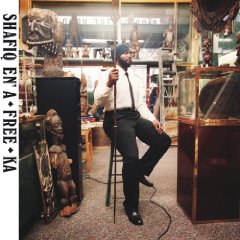Shafiq Husayn has made various statements about his art which on the surface are self-contradictory. On the one hand he urges his listeners always to be forward-thinking; on the other he summons a long train of ancestry. While the uninitiated might see plays on the words ‘Free’, ‘Africa’ or ‘Freak’ in the title, the Kemetic term ‘A-Free-Ka’ actually means infinity, and boundlessness. But his solo debut is also grounded right here on earth.
‘Sa-Ra’ is another Kemetic term, meaning son of the sun or child of the cosmos. As a member of Sa-Ra Creative Partners and a musical collaborator in his own right, Shafiq has musical connections direct and indirect with the likes of J Dilla, Kurupt, Questlove, Platinum Pied Pipers, N*E*R*D, James Poyser, Jill Scott, Talib Qweli, Jay Electronica, and not least Erykah Badu, who has said he is the only person she will allow to write lyrics for her. And then of course you could say he makes other kinds of musical connections, direct and indirect, with a diaspora of artists from Duke Ellington through Herbie Hancock and Fela Kuti right up to relative newcomers like Fatima, Jimetta Rose and Noni Limar, all of whom feature here.
Where Sa-Ra’s past two albums have been slick, often slurry bass-weighted hip hop affairs filled with tales of drugs, clubs, freaky sex, dirty cops and sometimes even love, there’s a tendency on En A-Free-Ka toward double-time rhythms and more ethereal content. It’s a difference of nuance rather than overall ethos. It’s as if the Sa-Ra universe was expanding.
This is the album’s weakness as well as its strength. It belongs very much to the hip hop world that spawned it — there will be people who don’t find ‘In A-Free-Ka’ new enough. But a throwaway world’s increasing demand for newness shouldn’t (and doesn’t) really matter. More interesting is the way Shafiq confronts and articulates the space-time contradictions between his forebears and the future, ancestry and the new breed, timelessness and moving on, and just how well he achieves his espoused goals of transcendence, love, peace and justice.
‘The U.N. Plan’ is about being stuck in a rut, "living in circles". A tight, delicious groove and surging drums accompany vocals about remembering to be a star. They duel with reflections in reverb, saying things like "her name was boo and she left me all alone to expand", as if a consciousness were struggling to put positive light on a situation. Its Babylonian counterpart ‘All Dead’ stomps and stumbles through minor chords, distortion and distant cymbals in a vision of earthly corruption. ‘Evil Man’ is a Doors-esque chant against evil, and ‘Major Heavy’ is psychedelic like the Beatles: they sit next to each other in hallucinatory counterpoint. ‘Lost and Found’ and ‘Dust and Kisses’ ally with Georgia Ann Muldrow and Like Water For Chocolate-era Common respectively.
The LP’s lead single, ‘Lil Girl’, featuring Fatima, is a triumph of Ariel harmonies over regret and anxiety. Inside all the melody there’s a strangely euphoric acknowledgement of death: ‘Eventually you shall embrace the last day / Time is coming better choose the fast way’. Alongside his work on Erykah Badu’s astonishing ‘New Amerykah’, ‘Lil Girl’ highlights just how much a good vocalist brings out Shafiq’s strengths. ‘The Odd Is C’ — an obvious play on ‘odyssey’ — would suggest that there’s a journey being made here. It all ends in the deliberately political and beautiful melancholia, still poised for action, of ‘Rebel Soldier’.
So En A-Free-Ka conjures a series of oppositions, where striving for freedom while stuck being alive makes perfect sense. And while the album’s drive is anticipatory, its obvious affiliations to other artists make its origins apparent in the present, instead of past and done with. There’s less real flesh here than on previous Sa-Ra; the pangs are ethereal rather than corporeal. The vision and the musical scope could be broader, but it articulates something about a spiritual struggle that is genuinely universal.


